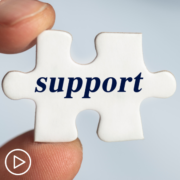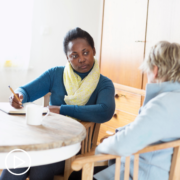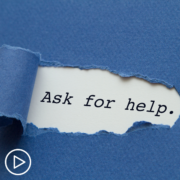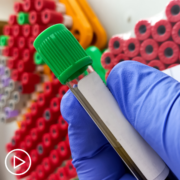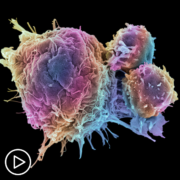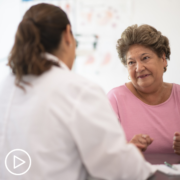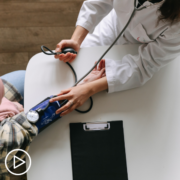How Can CAR T-Cell Therapy Care Partners Find Support?
How Can CAR T-Cell Therapy Care Partners Find Support? from Patient Empowerment Network on Vimeo.
Where can CAR T-cell therapy care partners access support? Expert Sarah Meissner and Adrienne, a care partner, discuss resources and share self-care advice for those caring for a loved one.
Sarah Meissner, RN, BSN, BMTCN, is a Blood and Marrow Transplant and Related Donor Search Coordinator at the Colorado Blood Cancer Institute. Adrienne is a Care Partner to her husband, who underwent CAR T-cell therapy.
See More from The Care Partner Toolkit: CAR T-Cell Therapy
Related Resources:
Transcript:
Katherine:
Sarah, this is, obviously, a very taxing experience for everyone, the patient and care partner. Where can care partners find support during this time looking outside family members and relatives nearby? What other resources are available?
Sarah Meissner:
Absolutely. I would encourage people to work with their local psychosocial team first. There may be support groups within the program that they’re receiving treatment at that could be helpful or, like Adrienne talked about, other patients or caregivers who have gone through this that they can be connected with.
There is also some great support resources through The Leukemia & Lymphoma Society. They do have caregiver support. They have patient support, connections with patients, and that kind of stuff. So, that is another good place to look as well as the different manufacturing groups that make these CAR T cells do have patient support groups as well. So, maybe some more information, maybe some caregiver resources. They’re all a little bit different but that would be another good place to look.
Katherine:
Adrienne, did you find any resources that you would recommend?
Adrienne:
Well, I used, and not on particularly CAR T cell but I do have one in there, but Facebook does have closed groups that you can join.
I did this for his bone marrow transplant. And I do get a lot of support on that particular one. It’s for spouses and caregivers in particular. So, look for that and there is one on CAR T cell but for multiple myeloma. But at the time, it was very new so there wasn’t a lot of back and forth on there. But you can really connect with people, and, of course, it’s not a substitute for any kind of medical advice. But it is nice to talk to people that are going through the same thing, especially with his bone marrow transplant. There were other caregivers that were, actually, doing it at the same time. So, that was kind of like a reassuring thing to have this little group of people that we knew were all doing it at the same time.
Katherine:
Yeah. That’s great support. Sarah, how can care partners make sure they’re taking care of themselves? What can they be doing?
Sarah Meissner:
I think it’s hard going through this process. The focus is so much on the patient and what they’re going through. And caregivers often forget that they have needs, too. So, taking the time to look within and recognize when you’re feeling stressed and maybe you need some support. Reaching out to friends and family is a great thing if you have that option. If you have the option to have somebody come in and hang out with the patient for a period of time, so you can go to a work out class or you can just go grab some groceries or go do something for yourself and have a few minutes that you’re not having to worry about watching the patient can be really a great thing for people.
Sometimes, if patients don’t have other support, caregivers will take the time that the patient is in clinic and being watched by the care team to maybe go run a quick errand or do something. And that’s definitely an option as well.
Katherine:
Adrienne, we talked about this, but do you have any advice for care partners as they begin the process?
Adrienne:
Yes. I would just say that it’s only temporary and that the first two weeks is really intense, but it definitely gets better. And just to keep your eyes peeled on all of those little things that might not be right, because it’s really important to get them back into clinic if they need it and to take a little time for yourself.
Katherine:
Yeah. Well, before we end the program, I’d like to get final thoughts from both of you. What message do you want to leave care partners with? Adrienne, let’s start with you. You may have already answered this question just a moment ago.
Adrienne:
The message that I think that we would like to give, my husband, too, is that this is a lot of work, but he has had a very successful remission. And it’s very promising, and we’re excited to have a long future with this. It’s much better than having chemo every week.
And it’s improved his quality of life. So, I think that as a caregiver, it’s a lot of work, but it’s definitely worth the work, because the end result, hopefully, will be life-changing.
Katherine:
Yeah. Sarah, do you have anything to add? What information would you like to leave care partners with?
Sarah Meissner:
Yeah. The care partners are such a crucial part of this process. Without them, we can’t provide this treatment. So, it’s a very important role, and we are very thankful that you are willing to do this for your loved one so that we can give them this treatment and, hopefully, get them into remission and have great results from that. So, make sure that you take the time that you need to be able to be there for your loved one and, again, just thank you for being willing to do this.

